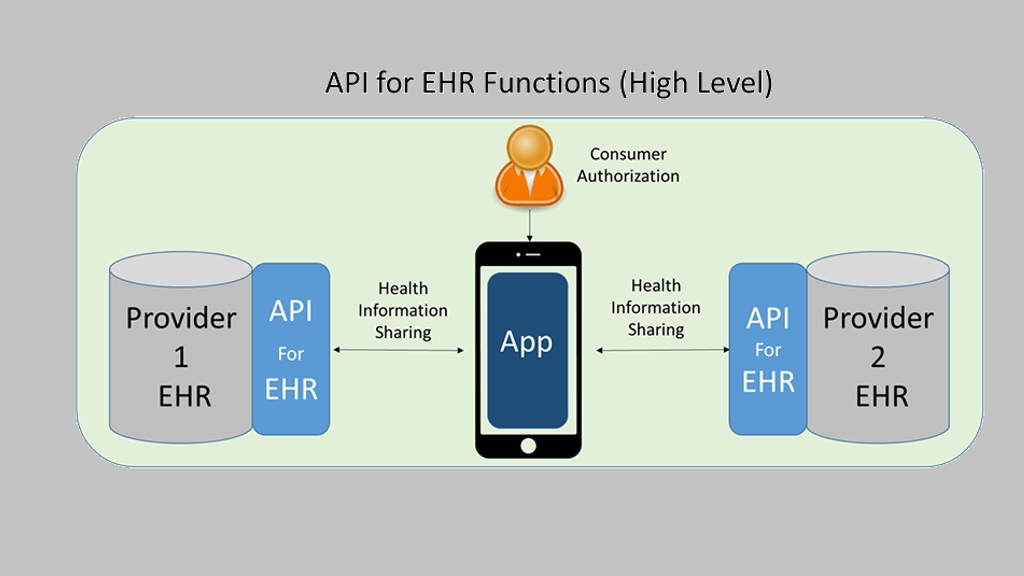Among the authors were the foundation’s Senior Vice President for Policy and Research Eric Schneider, MD, MSc, and former US Chief Technology Officer Aneesh Chopra. They see a growing discrepancy between the growing amounts of patient data and the access to this data by its owners: the patient. Making digital health data useful to patients is a national priority. Application program interface technologies, APIs, are needed to realize this goal.
An application programming interface (API) is a set of subroutine definitions, protocols, and tools for building application software. A good API makes it easier to develop a computer program by providing all the building blocks, which are then put together by the programmer. APIs make it easier for developers to use certain technologies in building applications.
APIs have the potential to remove many barriers to the sharing of health information between providers, patients, and others but are fairly new to healthcare. Also, not all types of APIs are equal when it comes to sharing digital health information. Some restrictive APIs could even be used instead to block patients from accessing their health information.
The certification program incentivizes the exchange of interoperable information between EHRs and other health IT systems such as apps, pharmacy systems, or laboratories. Because there are a variety of distinct EHRs and other health data systems that must communicate to mobilize health data, APIs are key to advancing health record interoperability. Achieving those advancements in healthcare interoperability will come down to how useful unlocked data is made to its end-users, especially patients.
Such benefits are:
• strengthening consumers’ ability to get, use, and share health information
• making it easier for them to move among providers
• helping providers coordinate care across settings
• reducing entry barriers and promoting innovation for new health apps, devices, and services.
In the public sector:
Actions in the private sector will require multiple stakeholders to take part:
If policymakers, delivery system leaders, and consumer advocates encourage the use of open APIs in health care now, they will clear a path for innovative uses of electronic health data that serve the needs of patients, thereby improving the quality and affordability of health care. If and when the best APIs for the job are chosen,APIs in healthcare should enable future innovations for using digital health data.
An application programming interface (API) is a set of subroutine definitions, protocols, and tools for building application software. A good API makes it easier to develop a computer program by providing all the building blocks, which are then put together by the programmer. APIs make it easier for developers to use certain technologies in building applications.
Patients need acces to their data
‘While more and more doctors’ offices, hospitals, and other providers are using electronic health records (EHRs), patients rarely have access to their digital health data,’ the post authors write. ‘And patients need more than access. They need to be able to view and share their data readily and rapidly.’ Examples are a mobile phone app that updates a patient’s doctors and pharmacy whenever a prescription is changed, or that allows test results from a specialist’s office in one city to be shared with a primary care physician back home.APIs have the potential to remove many barriers to the sharing of health information between providers, patients, and others but are fairly new to healthcare. Also, not all types of APIs are equal when it comes to sharing digital health information. Some restrictive APIs could even be used instead to block patients from accessing their health information.
Government support in US
In the US, APIs are starting to enter the EHR market because of the government’s Health IT Certification Program authorized under several federal laws: the Health Information Technology for Economic and Clinical Health (HITECH) Act, the Medicare Access and CHIP Reauthorization Act of 2015 (MACRA). The authors further note that imminent signing of the 21st Century Cures Act by President Obama will strengthen the push for making digital health data more accessible.The certification program incentivizes the exchange of interoperable information between EHRs and other health IT systems such as apps, pharmacy systems, or laboratories. Because there are a variety of distinct EHRs and other health data systems that must communicate to mobilize health data, APIs are key to advancing health record interoperability. Achieving those advancements in healthcare interoperability will come down to how useful unlocked data is made to its end-users, especially patients.
Unrestricted, no-cost access
Lets get back to the positive side: having openly accessible APIs could provide consumers (and other trusted entities they designate) with unrestricted, no-cost access to their own personal digital health information, thereby empowering better health, better care, and smarter spending.Such benefits are:
• strengthening consumers’ ability to get, use, and share health information
• making it easier for them to move among providers
• helping providers coordinate care across settings
• reducing entry barriers and promoting innovation for new health apps, devices, and services.
Actions to encourage adoption
The authors state several courses of action that can be taken in the public and private sector to encourage broad adoption of openly accessible APIs.In the public sector:
- Congress has encouraged the use of openly accessible APIs for patient health data through the recently enacted 21st Century Cures legislation.
- The Department of Health and Human Services (HHS) could use its authorities under previous legislation (HITECH and MACRA) and through 21st Century Cures to update its Health IT Certification Program to include consumer access to openly accessible APIs.
- HHS and/or Congress could fund development of open-source, standards-based API for EHR technologies through standards development organizations or groups of industry representatives.
Actions in the private sector will require multiple stakeholders to take part:
- Encourage public commitments from leading providers, payers, and EHR vendors to use openly accessible APIs through “consumer empowerment and interoperability pledges” or other public declarations.
- Provide purchasing tools such as model contracts and purchasing guides to help health providers procure openly accessible APIs.
- Invest in continued development of open-source API technologies through industry groups such as standards development organizations or market-driven consortia.
- Investment in open-source technologies should lower the cost of entry for new market entrants seeking to sell APIs to EHR vendors and providers. Providers and EHR vendors should support the ability to choose among multiple openly accessible APIs to encourage competitive markets for openly accessible APIs.
- Develop consensus standards for openly accessible APIs and related technologies.
If policymakers, delivery system leaders, and consumer advocates encourage the use of open APIs in health care now, they will clear a path for innovative uses of electronic health data that serve the needs of patients, thereby improving the quality and affordability of health care. If and when the best APIs for the job are chosen,APIs in healthcare should enable future innovations for using digital health data.








